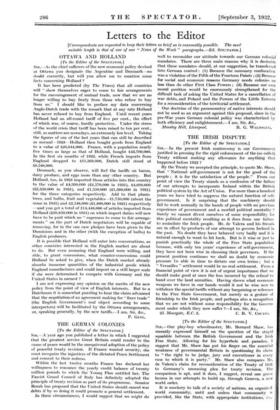THE IRISH DISPUTE [To the Editor of the SPECTATOR.]
SIR,—In the present Irish controversy is our Government justified in pressing for the rigid enforcement of the (so called) Treaty without making any allowance for anything that happened before 1922 ?
By the Treaty we accepted the principle, to quote Mr. Shaw, that " National self-government is not for the good of the people ; it is for the satisfaction of the people." From our point of view the Treaty stands as a confession of the failure of our attempts to incorporate Ireland within the British political system by the Act of Union. For more than a hundred years we have tried to suppress the natural function of self- government. Is it surprising that the machinery should fail to work normally in the hands of people with no previous experience of government and a morbid political mentality ? Surely we cannot divest ourselves of some responsibility for this political mentality resulting as it does from our failure to assimilate the Irish people. Mr. de Valera and his friends are in effect by-products of our attempt to govern Ireland in the past. No doubt they have behaved very badly and it is natural enough to want to hit back. But is it wise or just to punish practically the whole of the Free State population because, with only ten years' experience of self-government, they have not been wise in choosing their governors. If the present position continues we shall no doubt by economic pressure he able in time to dictate our own terms ; but a " Versailles " settlement would be no real settlement. From a financial point of view it is not of urgent importance that we should make good at once the loss incurred by the refusal to hand over the land annuities. Having shown what economic weapons we have in our hands would it not be wise now to withdraw the special tariffs without any bargaining or reference to the Free State Government, but merely as a- gesture of friendship to the Irish people, and perhaps also a recognition that we are not without some responsibility for the Govern- ment under which they now suffer ?—I am, Sir, &c.,






























 Previous page
Previous page